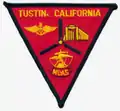Marine Corps Air Station Tustin
Marine Corps Air Station Tustin (IATA: NTK, ICAO: KNTK, FAA LID: NTK) is a former United States Marine Corps air station, located in Tustin, California.
| Marine Corps Air Station Tustin | |
|---|---|
| Tustin, California | |
 Hangar No. 2 (Building 29) at the former Marine Corps Air Station in Tustin, California measures 1,072 feet (327 m) long by 292 feet (89 m) wide by 192 feet (59 m) tall. It and its "sister" structure (partially visible to the right) are listed on the National Register of Historic Places and designated a National Historic Civil Engineering Landmark. The two hangars, built in 1942 of Oregon Douglas fir, are among the largest freestanding wooden structures in the world.
While its sister structure (the North Hangar) is slated to be included in a new park, the future of this hangar is uncertain.[1] | |
| Type | Military base |
| Site information | |
| Controlled by | United States Marine Corps |
| Site history | |
| Built | commencing 1 April 1942 |
| In use | 7 October 1942 – 2 July 1999 |
History
The Air Station was established in 1942 as Naval Lighter-Than-Air Station Santa Ana, a base for airship operations in support of the United States Navy coastal patrol efforts during World War II. It was commissioned on 1 October 1942 by its commandant, Capt. Howard N. Coulter.[2] As of July 1947, the facility, under command of Capt. Benjamin May, had personnel consisting of 100 officers, 500 enlisted men and 180 civilian employees.[3] NLTAS Santa Ana was decommissioned in 1949. In 1951, the facility was reactivated as Marine Corps Air Facility Santa Ana to support the Korean War. It was the country's first air facility developed solely for helicopter operations. It was renamed Marine Corps Air Station Tustin in 1979.
During the Vietnam War, the base was a center for on-going testing of radar installations (including the Sperry TPS-34) which were erected, tested, disassembled and shipped to South Vietnam. It also was a training facility for helicopter pilots.
By the early 1990s, MCAS Tustin was a major center for Marine Corps helicopter aviation and radar on the Pacific Coast. Its primary purpose was to provide support services and material for the 3rd Marine Aircraft Wing and for other units utilizing the base. About 4,500 residents once lived on the base, and the base employed nearly 5,000 military personnel and civilians. In addition to providing military support, MCAS Tustin leased 530 acres (2.1 km2) to farmers for commercial crop development. For many years, agricultural lands surrounded the facility. However beginning in the 1980s residential and light industrial/manufacturing areas developed adjacent to the station.
In 1991 and again in 1993, under the authority of the Base Realignment and Closure Act of 1990, it was announced that MCAS Tustin would be closed. Operational closure of the base occurred in July 1999. However, the north hangar is still used as a storage and repair center for commercial blimps. Of the approximately 1,600 acres (650 ha), some 1,294 acres (524 ha) (now known collectively as "Tustin Legacy") have been conveyed to the City of Tustin, private developers and public institutions for a combination of residential, commercial, educational, and public recreational and open-space uses. The remaining 300-plus acres (120 ha) will be conveyed to other federal agencies, the City of Tustin and public institutions for the same uses once environmental clean-up operations have been concluded. The site of the base is now the home of the academy of the Orange County Sheriff's Department. Much of the former base has become residential housing.
In 1993, the blimp hangars were designated a National Civil Engineering Landmark by the American Society of Civil Engineers (ASCE). There have been talks regarding making one of the hangars a military museum.
Worldwide Aeros Corp is, as of 2013, utilizing one of the historic hangars to build a prototype cargo airship under contract from the Pentagon and NASA.[4] In October, 2013, part of the roof collapsed, damaging the airship prototype.[5]
Future
Plans are in the works to convert 84.5 acres of the former base into a regional park, to be opened in 2016.[1] As of the summer of 2013, OC Parks is in the process of gathering input from the community in order to determine the features and layout of the forthcoming facilities.
Although the preservation of the hangars is one of the greatest concerns raised in surveys taken by OC Parks, the fate of the south hangar is uncertain.
The City of Tustin has reportedly met with officials from the Los Angeles Angels of Anaheim, proposing the former air base as a potential site for a new stadium for the team, whose lease with the City of Anaheim's Angel Stadium allows the team to opt out between 2016 and 2019.[6]
In 2016, Orange County and the South Orange County Community College District arranged for a land swap of ten acres to be used to replace the aging Orange County Animal Shelter in nearby Orange. In July 2016, a groundbreaking ceremony was held.[7]
 Hangar No. 1 at MCAS Tustin under construction, 1942.
Hangar No. 1 at MCAS Tustin under construction, 1942. A different view of Hangar No. 1 under construction.
A different view of Hangar No. 1 under construction. Six helium-filled blimps stored in one of the two hangars at MCAS Tustin, date unknown.
Six helium-filled blimps stored in one of the two hangars at MCAS Tustin, date unknown. A 1943 photo of a Navy 'K' type blimp in front of one of MCAS Tustin's massive blimp hangars.
A 1943 photo of a Navy 'K' type blimp in front of one of MCAS Tustin's massive blimp hangars. A March, 1966 photo of a CH-46A "Sea Knight" helicopter from HMM-165, with one of Tustin's massive blimp hangars in the background.
A March, 1966 photo of a CH-46A "Sea Knight" helicopter from HMM-165, with one of Tustin's massive blimp hangars in the background. A USMC CH-53D "Sea Stallion" helicopter undergoes maintenance inside one of MCAS Tustin's giant blimp hangars, date unknown.
A USMC CH-53D "Sea Stallion" helicopter undergoes maintenance inside one of MCAS Tustin's giant blimp hangars, date unknown. MCAS Tustin insignia.
MCAS Tustin insignia.
See also
References
- "Regional Park at Former MCAS Tustin". Retrieved 23 May 2013.
- Associated Press, "Dirigible Base Is Opened at Santa Ana", The San Bernardino Daily Sun, San Bernardino, California, Friday 2 October 1942, Volume 49, page 1.
- Associated Press, "Santa Ana to Lose Naval Air Station", The San Bernardino Daily Sun, San Bernardino, California, Monday 28 July 1947, Volume 53, page 2.
- W.J. Henningan (4 January 2013). "Construction is complete on behemoth airship; first flight planned". Los Angeles Times. Retrieved 7 January 2013.
- Flores, Adolfo; Bartletti, Don (October 7, 2013). "WWII-era blimp hangar's partial collapse triggers helium leak". Los Angeles Times. Retrieved 20 March 2018.
- DiGiovanna, Mike. "Angels owner Arte Moreno meets with Tustin officials to talk stadium". Los Angeles Times. Los Angeles Times. Retrieved 19 February 2014.
- Nissen, Dano. "$35 Million Animal Shelter Replaces Tustin Marine Base". KNBC. NBC. Retrieved 2 August 2016.
External links
| Wikimedia Commons has media related to Marine Corps Air Station Tustin. |
- OC Parks
- Base Realignment and Closure Project Management Office
- Marine Corps Air Station, Tustin at The California State Military Museum
- Info from globalsecurity.org
- Info from Paul Freeman's Abandoned & Little-Known Airfields
- Photos of the Air Station at the Tustin Historical Society website
- History of base provided by US Navy
- http://ocparks.com/about/projects/tbh

